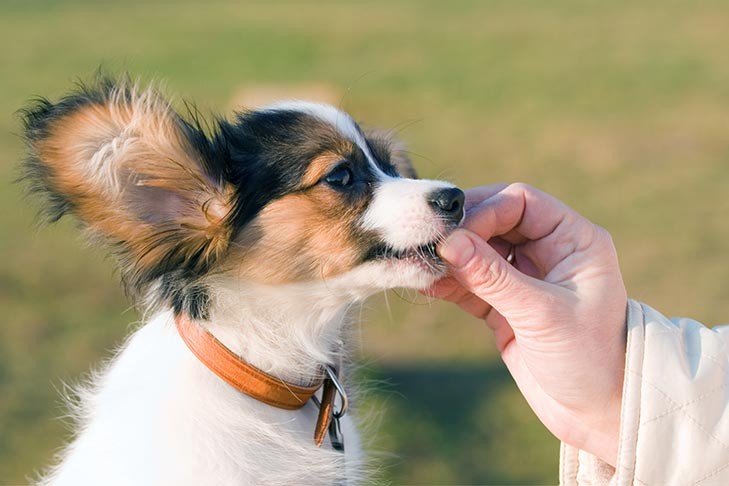Pepto Bismol for dogs can be a topic of concern for pet owners dealing with canine digestive issues, so understanding the correct dosage and safety precautions is crucial. At HOW.EDU.VN, our team of experienced doctors offers insights on the appropriate use of medications like Pepto Bismol to ensure your dog’s well-being. Learn about alternative treatments and personalized advice for your dog’s health.
1. Understanding Pepto Bismol and Its Use in Dogs
Pepto-Bismol, known generically as bismuth subsalicylate, is a common over-the-counter medication used to treat stomach upset, diarrhea, and indigestion in humans. While it’s readily available, its use in dogs requires careful consideration due to potential side effects and interactions.
1.1. What is Pepto Bismol?
Pepto-Bismol contains bismuth subsalicylate, which works by coating the lining of the stomach and intestines to reduce inflammation and kill certain bacteria that may cause diarrhea. The salicylate component is an anti-inflammatory, similar to aspirin.
1.2. When is Pepto Bismol Considered for Dogs?
Pepto-Bismol might be considered for dogs experiencing mild gastrointestinal (GI) upset, such as diarrhea or vomiting. However, it’s essential to consult a veterinarian before administering any medication to your dog to ensure it’s safe and appropriate for their specific condition.
1.3. Potential Risks and Side Effects
- Salicylate Toxicity: Dogs are more sensitive to salicylates than humans. Overdosing can lead to salicylate toxicity, with symptoms including:
- Rapid breathing
- Vomiting
- Lethargy
- Seizures
- Black Stool: Bismuth can turn the stool black, which can mask the appearance of melena (digested blood in the stool), making it difficult to identify more serious GI bleeding.
- Interactions with Other Medications: Pepto-Bismol can interact with other drugs, such as NSAIDs and corticosteroids, increasing the risk of adverse effects.
- Not Suitable for All Dogs: It is not recommended for dogs with bleeding disorders, pregnant or nursing dogs, or those taking NSAIDs.
2. Determining the Correct Dosage of Pepto Bismol for Dogs
If, after consulting with your veterinarian, you decide to use Pepto-Bismol, it’s crucial to administer the correct dosage. An accurate dosage based on your dog’s weight is essential to minimize the risk of side effects and ensure the medication is effective.
2.1. General Dosage Guidelines
The general guideline for Pepto-Bismol dosage in dogs is 1 teaspoon (5 ml) per 10 pounds of body weight. This can be administered every 6 to 8 hours.
2.2. Importance of Consulting a Veterinarian
Always consult your veterinarian before giving Pepto-Bismol to your dog. They can provide specific dosage instructions based on your dog’s individual needs, medical history, and current medications.
2.3. Steps to Calculate the Correct Dosage
- Weigh Your Dog: Determine your dog’s exact weight in pounds.
- Calculate Dosage: Use the guideline of 1 teaspoon per 10 pounds. For example, if your dog weighs 20 pounds, the correct dose would be 2 teaspoons.
- Use an Accurate Measuring Tool: Use a syringe or measuring spoon to ensure the dose is accurate.
- Administer the Medication: Give the medication directly into your dog’s mouth, or mix it with a small amount of food if necessary.
- Monitor Your Dog: Watch for any signs of adverse reactions, such as increased vomiting, lethargy, or changes in stool color.
2.4 Dosage Chart for Pepto Bismol for Dogs
| Dog’s Weight (lbs) | Dosage (teaspoons) | Dosage (ml) | Frequency |
|---|---|---|---|
| 5 | 0.5 | 2.5 | Every 6-8 hours |
| 10 | 1 | 5 | Every 6-8 hours |
| 15 | 1.5 | 7.5 | Every 6-8 hours |
| 20 | 2 | 10 | Every 6-8 hours |
| 25 | 2.5 | 12.5 | Every 6-8 hours |
| 30 | 3 | 15 | Every 6-8 hours |
| 35 | 3.5 | 17.5 | Every 6-8 hours |
| 40 | 4 | 20 | Every 6-8 hours |
| 45 | 4.5 | 22.5 | Every 6-8 hours |
| 50 | 5 | 25 | Every 6-8 hours |


Note: This chart is a general guide. Always consult with your veterinarian for the most accurate dosage based on your dog’s individual needs.
3. Safe Administration Techniques for Pepto Bismol
Administering medication to dogs can be challenging. Using the right techniques ensures that your dog receives the correct dose safely and without unnecessary stress.
3.1. Preparing for Administration
- Measure the Correct Dose: Use a syringe or measuring spoon to ensure the correct dosage.
- Choose the Right Formulation: Liquid formulations are generally easier to administer than pills.
- Gather Supplies: Have everything you need within reach, including the medication, a syringe, and a small treat (if allowed).
3.2. Step-by-Step Guide to Administering Liquid Pepto Bismol
- Position Your Dog: Sit your dog in a comfortable position, either on the floor or in your lap.
- Hold the Syringe: Fill the syringe with the correct dose of Pepto-Bismol.
- Open Your Dog’s Mouth: Gently open your dog’s mouth by placing your non-dominant hand over their muzzle and applying gentle pressure.
- Insert the Syringe: Insert the tip of the syringe into the side of your dog’s mouth, between their cheek and teeth.
- Administer the Medication: Slowly push the plunger of the syringe to release the medication.
- Ensure Swallowing: Hold your dog’s muzzle closed for a few seconds and gently stroke their throat to encourage swallowing.
- Praise and Reward: Offer praise and a small treat (if appropriate) to positively reinforce the experience.
3.3. Tips for Minimizing Stress During Administration
- Stay Calm: Dogs can sense anxiety, so remain calm and confident.
- Be Gentle: Avoid forcing the medication. If your dog resists, try again later.
- Use Positive Reinforcement: Reward your dog with praise and treats.
- Consider Mixing with Food: If your veterinarian approves, mix the medication with a small amount of food.
4. When to Avoid Giving Pepto Bismol to Your Dog
While Pepto-Bismol can be a helpful remedy for mild digestive issues, there are specific situations where it should be avoided entirely to prevent potential harm to your dog.
4.1. Dogs with Known Allergies or Sensitivities
If your dog has a known allergy or sensitivity to salicylates or bismuth, avoid giving Pepto-Bismol. Allergic reactions can range from mild skin irritation to severe anaphylaxis, which requires immediate veterinary attention.
4.2. Dogs with Bleeding Disorders
Pepto-Bismol contains salicylates, which can thin the blood and interfere with clotting. Dogs with bleeding disorders, such as von Willebrand’s disease or hemophilia, should not be given Pepto-Bismol.
4.3. Pregnant or Nursing Dogs
The safety of Pepto-Bismol in pregnant or nursing dogs has not been established. It’s best to avoid giving this medication to pregnant or nursing dogs unless specifically directed by a veterinarian.
4.4. Dogs Taking Certain Medications
Pepto-Bismol can interact with other medications, such as NSAIDs (e.g., Rimadyl, Deramaxx) and corticosteroids. Combining these medications can increase the risk of GI bleeding and other adverse effects. Always inform your veterinarian of all medications your dog is taking before administering Pepto-Bismol.
4.5. Puppies
Puppies are more sensitive to the effects of medications than adult dogs. Avoid giving Pepto-Bismol to puppies unless specifically instructed by a veterinarian.
5. Recognizing Signs of Adverse Reactions
Even when administered correctly, Pepto-Bismol can sometimes cause adverse reactions in dogs. Recognizing these signs early and seeking prompt veterinary care can help prevent serious complications.
5.1. Common Signs of an Allergic Reaction
- Hives or skin rash
- Facial swelling
- Difficulty breathing
- Vomiting or diarrhea
- Lethargy or weakness
5.2. Signs of Salicylate Toxicity
- Rapid breathing
- Vomiting
- Lethargy
- Incoordination
- Seizures
5.3. What to Do If You Suspect an Adverse Reaction
- Stop Giving the Medication: Immediately stop administering Pepto-Bismol.
- Contact Your Veterinarian: Call your veterinarian or local emergency veterinary clinic.
- Provide Information: Be prepared to provide information about the dosage of Pepto-Bismol given, your dog’s weight, and any other medications they are taking.
- Follow Veterinary Advice: Follow your veterinarian’s instructions carefully. They may recommend bringing your dog in for an examination or further treatment.
6. Alternative Medications and Treatments for Canine Digestive Issues
If Pepto-Bismol is not suitable for your dog, or if you prefer to explore other options, several alternative medications and treatments can help manage canine digestive issues.
6.1. Imodium (Loperamide)
Imodium, known generically as loperamide, is an over-the-counter medication that can help resolve diarrhea in dogs. It works by slowing down the movement of the intestines, allowing more water to be absorbed and reducing the frequency of bowel movements.
- Dosage: The typical dosage is one 2-milligram pill per 40 pounds of body weight, given two to three times a day.
- Precautions: Consult your veterinarian before administering Imodium, as it is not suitable for all dogs, particularly those with certain medical conditions or those taking specific medications.
6.2. Pepcid (Famotidine)
Pepcid, known generically as famotidine, is an H2 receptor antagonist that reduces the production of stomach acid. It can be helpful for dogs with acid reflux, gastritis, or other conditions that cause excessive stomach acid.
- Dosage: The typical dosage is 0.25 to 0.5 mg per pound of body weight, given every 12 to 24 hours.
- Precautions: It is best to give Pepcid one hour before meals. Always consult your veterinarian before administering Pepcid.
6.3. Probiotics
Probiotics are beneficial bacteria that can help restore the balance of the gut microbiome. They can be particularly helpful for dogs with diarrhea or other digestive issues.
- Dosage: Follow the instructions on the product label or consult your veterinarian for specific dosage recommendations.
- Precautions: Probiotics are generally safe for dogs, but it’s essential to choose a high-quality product specifically formulated for pets.
6.4. Bland Diet
A bland diet, such as boiled chicken and rice, can help soothe an upset stomach and reduce diarrhea. This diet is easily digestible and provides essential nutrients without irritating the GI tract.
- Preparation: Boil skinless, boneless chicken until fully cooked. Cook white rice until soft. Mix the chicken and rice in a 1:2 ratio (e.g., one part chicken to two parts rice).
- Feeding: Feed small, frequent meals throughout the day. Gradually transition back to your dog’s regular diet over several days.
6.5. Pumpkin
Plain, unsweetened pumpkin puree is a good source of fiber and can help regulate bowel movements. It can be helpful for both diarrhea and constipation in dogs.
- Dosage: The typical dosage is 1 to 4 tablespoons per day, depending on the size of your dog.
- Precautions: Ensure the pumpkin puree is plain and does not contain any added sugar or spices.
7. When to Seek Professional Veterinary Care
While home remedies and over-the-counter medications can be helpful for mild digestive issues, it’s essential to recognize when professional veterinary care is necessary.
7.1. Persistent or Severe Symptoms
If your dog’s symptoms persist for more than 24-48 hours, or if they are severe, seek veterinary care. Persistent or severe symptoms can indicate a more serious underlying condition that requires professional treatment.
7.2. Signs of Dehydration
- Excessive panting
- Dry nose and gums
- Sunken eyes
- Loss of skin elasticity
7.3. Blood in Stool or Vomit
The presence of blood in your dog’s stool or vomit is a serious sign that requires immediate veterinary attention.
7.4. Abdominal Pain or Distension
If your dog is experiencing abdominal pain or distension, it could indicate a serious condition such as bloat, pancreatitis, or intestinal obstruction.
7.5. Other Concerning Symptoms
- Lethargy or weakness
- Loss of appetite
- Fever
- Difficulty breathing
8. Preventing Digestive Issues in Dogs
Preventing digestive issues is always better than treating them. Several strategies can help keep your dog’s digestive system healthy and reduce the risk of GI upset.
8.1. High-Quality Diet
Feed your dog a high-quality diet that is appropriate for their age, breed, and activity level. Look for foods that contain easily digestible ingredients and avoid those with artificial colors, flavors, or preservatives.
8.2. Gradual Diet Changes
When changing your dog’s diet, do so gradually over a period of 5-7 days to allow their digestive system to adjust.
8.3. Avoid Table Scraps
Avoid feeding your dog table scraps, as these can be high in fat and difficult to digest.
8.4. Regular Exercise
Regular exercise can help promote healthy digestion and prevent constipation.
8.5. Fresh Water
Ensure your dog always has access to fresh, clean water. Dehydration can contribute to digestive issues.
8.6. Regular Veterinary Check-ups
Schedule regular veterinary check-ups to monitor your dog’s overall health and detect any potential digestive issues early.
9. The Expertise of HOW.EDU.VN Doctors
At HOW.EDU.VN, we understand the challenges pet owners face when dealing with their dogs’ health issues. Our team of experienced doctors is dedicated to providing expert advice and personalized solutions to ensure your pet’s well-being.
9.1. Access to Leading Veterinarians
Our platform connects you with leading veterinarians who have extensive knowledge and experience in treating canine digestive issues.
9.2. Personalized Advice
We offer personalized advice tailored to your dog’s specific needs, medical history, and current condition.
9.3. Comprehensive Solutions
Our team can provide comprehensive solutions, including medication recommendations, dietary advice, and preventive strategies.
9.4. Convenient and Accessible
Our services are convenient and accessible, allowing you to consult with a veterinarian from the comfort of your own home.
10. How HOW.EDU.VN Can Help
Navigating your dog’s health concerns can be overwhelming. HOW.EDU.VN offers a streamlined platform to connect you with the expertise you need.
10.1. Connect with Expert Doctors
Our platform provides direct access to a network of over 100 renowned doctors across various specialties. Whether you’re seeking a second opinion or need specialized guidance, HOW.EDU.VN ensures you receive top-tier advice.
10.2. Personalized Consultation Services
We offer tailored consultations to address your specific concerns. Our experts take the time to understand your dog’s unique situation, providing actionable insights and customized treatment plans.
10.3. Save Time and Resources
Skip the endless online searches and potential misinformation. HOW.EDU.VN consolidates expert knowledge in one place, saving you valuable time and resources.
10.4. Secure and Confidential
Your privacy is our priority. Our platform ensures secure communication and confidentiality, so you can discuss your dog’s health concerns with peace of mind.
10.5. Empowerment Through Knowledge
At HOW.EDU.VN, we empower you with the knowledge to make informed decisions about your dog’s health. Our experts provide clear explanations and practical advice, helping you confidently navigate your dog’s care.
11. Case Studies: Success Stories with HOW.EDU.VN
While we cannot reveal specific client details, here are a few examples of how our expertise has helped pet owners address their dogs’ health issues:
11.1. Resolving Chronic Diarrhea
A client’s dog had been suffering from chronic diarrhea for several months. After consulting with one of our veterinarians, we identified a food sensitivity and recommended a specialized diet. Within a few weeks, the dog’s diarrhea resolved, and their overall health improved.
11.2. Managing Acid Reflux
Another client’s dog was experiencing frequent acid reflux and vomiting. After consulting with one of our specialists, we recommended a combination of medication and dietary changes. The dog’s symptoms improved significantly, and they were able to enjoy a better quality of life.
12. FAQ About Pepto Bismol for Dogs
12.1. Is Pepto Bismol safe for all dogs?
No, Pepto Bismol is not safe for all dogs. It should be avoided in dogs with bleeding disorders, pregnant or nursing dogs, and those taking certain medications.
12.2. How often can I give my dog Pepto Bismol?
Pepto Bismol can be given every 6 to 8 hours, but it should not be given for more than 48 hours without consulting a veterinarian.
12.3. What are the side effects of Pepto Bismol in dogs?
Side effects can include salicylate toxicity, black stool, and interactions with other medications.
12.4. Can I give my puppy Pepto Bismol?
Avoid giving Pepto Bismol to puppies unless specifically instructed by a veterinarian.
12.5. What should I do if my dog has an allergic reaction to Pepto Bismol?
Stop giving the medication and contact your veterinarian immediately.
12.6. Are there any alternatives to Pepto Bismol for dogs?
Yes, alternatives include Imodium, Pepcid, probiotics, a bland diet, and pumpkin.
12.7. When should I seek veterinary care for my dog’s digestive issues?
Seek veterinary care if your dog’s symptoms persist for more than 24-48 hours, or if they are severe.
12.8. Can I use human probiotics for my dog?
It’s best to use probiotics specifically formulated for pets, as these contain strains of bacteria that are more beneficial for dogs.
12.9. How can I prevent digestive issues in my dog?
Feed your dog a high-quality diet, make gradual diet changes, avoid table scraps, provide regular exercise, and ensure access to fresh water.
12.10. What should I do if my dog accidentally overdoses on Pepto Bismol?
Contact your veterinarian or local emergency veterinary clinic immediately.
13. Connect with Our Expert Doctors Today
Don’t navigate your dog’s health concerns alone. At HOW.EDU.VN, we’re committed to providing you with the expertise and support you need to ensure your pet’s well-being. Our team of experienced doctors is ready to answer your questions, provide personalized advice, and help you find the best solutions for your dog’s digestive issues.
13.1. Immediate Assistance
For immediate assistance and expert advice, contact us today:
- Address: 456 Expertise Plaza, Consult City, CA 90210, United States
- WhatsApp: +1 (310) 555-1212
- Website: HOW.EDU.VN
13.2. Empowering Pet Owners
Trust how.edu.vn to connect you with the expertise you deserve. Because your dog’s health is our top priority.

